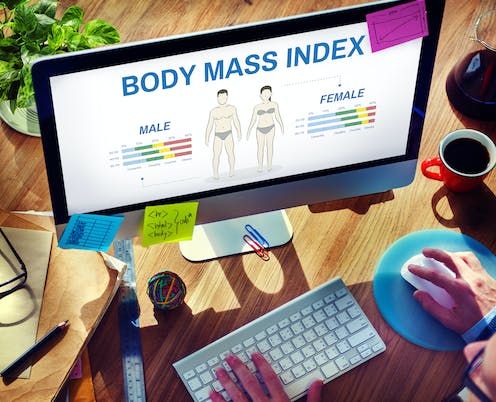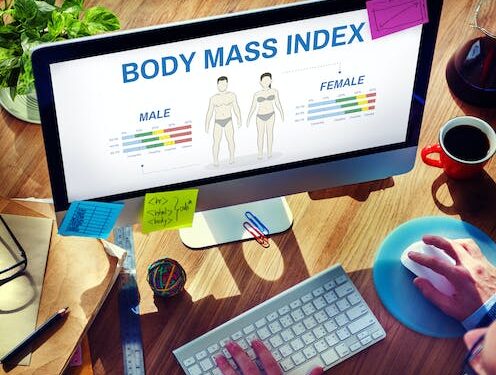
Body mass index has long been used by doctors as the standard method for measuring health – and often still is. But earlier this month, the American Medical Association (AMA) adopted a new policy that cautions medical professionals from using the body mass index (BMI) as a stand-alone clinical tool during patient consultations. In 2022, England’s National Institute for Health and Care Excellence (Nice) also made similar changes to obesity guidelines, recommending that waist-to-hip ratio be used alongside BMI.
It’s hardly surprising this new policy recommendation has been made given the widespread recognition in recent years that BMI has many limitations – particularly when used to make judgements about body weight, and, importantly, health.
Such issues are perhaps expected considering the origins of the BMI and its intended purpose. Body mass index was created in 1832 by Belgian mathematician Adolphe Quetelet. The Quetelet index, as it was originally called, was designed as a tool to study health in populations – not individuals.
The unintended use of the BMI to classify a person’s weight status came in 1995, after the World Health Organization published what we now consider the standard BMI criteria. Interestingly, the subsequent misuse of BMI was an indirect consequence of this formal categorisation, as even the World Health Organization explicitly stated in this report that BMI should always be interpreted alongside other determinants of health.
BMI is calculated by taking a person’s weight in kilograms and dividing it by their height in metres squared. The result is then used to categorise a person’s weight status. A BMI of 18.5-24.9 is considered healthy weight, while a BMI of 25.0 – 29.9 is considered overweight, and over 30 indicates obesity.
But while BMI is a quick and easy way to get a general picture of a person’s weight status, there are many limitations with only using this to determine a person’s health.
First, BMI doesn’t account for body composition – the proportion of fat, muscle and bone a person has. This is important to know because excess body fat is what may increase our risk of certain health conditions. This means that people who are muscular, such as athletes, may have high BMI values despite having low body fat. This could lead to an incorrect assumption that they’re unhealthy.
BMI also doesn’t consider where a person stores their body fat. This is important, as body fat stored in certain areas may carry greater health risks.

Peakstock/ Shutterstock
When we initially gain body fat, it’s typically stored just beneath the skin’s surface. In acceptable amounts, this fat is not especially damaging to health – particularly when in the lower body.
But when you have high levels of body fat, it accumulates in places it’s not meant to be stored – such as in and around internal organs. It’s particularly dangerous when this fat accumulates in the tummy, due to its proximity to many important organs, such as the liver. Research has shown that excess tummy fat is linked to health complications such as type 2 diabetes and heart disease.
Another major issue with BMI is that the criteria used to designate a person’s weight status was developed primarily using data from white populations. This means that it may not be as useful – or accurate – when used on people from different ethnic groups. For example, south Asians are at greater risk of developing obesity-related health conditions (such as type 2 diabetes) at a lower BMI compared to white people. While this has led to the creation of ethnic-specific BMI measures for south Asians, these aren’t universally implemented.
Given that men and women tend to store fat in different places, and that women are typically smaller, the relationship between BMI and health may differ between men and women.
Because of its simplicity, BMI has historically been a useful tool that allows scientists to study body weight in large populations over long periods of time. It has helped experts recognise and respond to rising levels of obesity, and understand the risk factors for obesity.
But on an individual level, BMI is not very useful in giving practitioners (and patients) a clear understanding of their health and the conditions they may be at risk of. This is why the AMA and Nice recommend always using BMI in conjunction with other tools – such as waist circumference and waist-to-hip ratio. This gives practitioners a better idea of where a person stores body fat and will give an overall clearer picture of a patient’s health.
The AMA’s decision is logical and timely. Putting less emphasis on BMI and looking at other aspects of health may ensure patients receive better care and support, and may also help to combat the weight-related stigma that many experience in healthcare settings.
![]()
James King is an Associate Editor for the International Journal of Obesity
David Stensel is co-Editor-in-Chief for the International Journal of Obesity. He receives research funding from the National Institute for Health and Care Research (NIHR) Leicester Biomedical Research Centre.
Dimitris Papamargaritis has received grant funding from Novo Nordisk A/S, Novo Nordisk UK Research Foundation, Academy of Medical Sciences/ Diabetes UK and Health Education East Midlands. He has been an National Institute of Health and Care Research Clinical Lecturer in Diabetes and Endocrinology. He is also a member of the academic committee of the Association of British Clinical Diabetologists and a Trustee of the Association for the Study of Obesity.






























